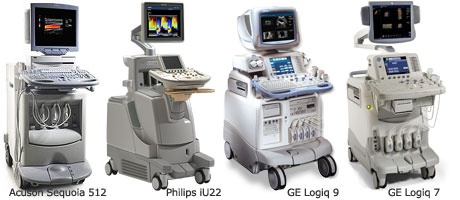Ultrasound machines are used to view the structures of the inside of the body. An ultrasound technician can view your bones, muscles, and organs. Many diseases,conditions, and problems are detected or diagnosed using an ultrasound. Ultrasound technicians are also the people who tell you if you are having a baby boy or a baby girl. Ultrasounds are a safe way to monitor the growth and health of babies that are still inside the uterus.
Ultrasound technology is fairly simple and borrows from nature. Bats and dolphins use a very similar technique to see in dark or vast environments, like the ocean and at night. Bats are basically blind, but they use echolocation to see everything around them. They send out high frequency sound waves that are mostly inaudible to the human ear, and when those sound waves bounce off of things, the bat sees an image of whatever is in front of it in its brain. Dolphins do the same thing in the ocean. They use echolocation, or sound waves, to find fish and determine distances.
 Ultrasound machines use the same idea. An ultrasound wand sends and receives very high frequency sounds waves. Ultrasound technicians use a gel to make a smooth connection between the skin and the ultrasound wand. The sound waves are sent into the body and bounce back off of all the structures of the internal organs, bones, and muscles. Ultrasounds are safe enough to use on babies and on the brain.
Ultrasound machines use the same idea. An ultrasound wand sends and receives very high frequency sounds waves. Ultrasound technicians use a gel to make a smooth connection between the skin and the ultrasound wand. The sound waves are sent into the body and bounce back off of all the structures of the internal organs, bones, and muscles. Ultrasounds are safe enough to use on babies and on the brain.
Some ultrasound technician schools train ultrasound techs with a focus on neurology. Ultrasound technicians that use ultrasounds to see the brain can detect aneurysms and tumors. In fact, ultrasounds are used throughout the body to identify unexplained growths such as cancerous tumors and liquid filled cysts. Ultrasound technicians who train and focus in obstetrics, or women’s reproductive health, can also determine whether a lump in the breast is a liquid filled cyst or a solid tumor.
It takes quite a bit of training and you must be certified to become an ultrasound technician and use an ultrasound machine. Ultrasound technician training courses are usually two years and require skills in math and science. They are also required to work in the field during their schooling, usually a considerable number of hours per week. Clinical experience is invaluable, as it gives hands on examples of what they will encounter in their professional career.
Recent Comments